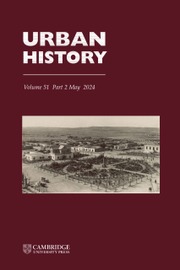Article contents
Medieval urban history and the history of political thought1
Published online by Cambridge University Press: 09 February 2009
Extract
One of the problems of urban history is the fearsome range of expertise that the urban historian is supposed to appreciate, if not master. Belaboured, rightly, by archaeologists, geographers, and architectural historians, we have begun to open our eyes to the evidence of the physical environment of medieval towns, but that is not the half of it. In order to understand urban institutions one needs to be a religious historian, an economic historian, a legal historian; and if one were ever to make sense of everything that is included in the ‘social history’ of towns, then social anthropology, historical demography, and sociology are only three of the battery of foglamps that would be needed to penetrate our cloud of unknowing. The subject which I now wish to add to the list of those we are supposed to cover does not even have the attraction of sounding new and modish and exciting. The history of political thought has, after all, formed a part of undergraduate history courses in this country ever since they began, and it is traditionally one of the least popular and least satisfactory parts of them, especially for the sort of students who may go on to be interested in urban history: those who relish the exact, the local detail, the reality of topography, the ability to connect the documents of the past with visible phenomena in the present.
- Type
- Research Article
- Information
- Copyright
- Copyright © Cambridge University Press 1982
Footnotes
This paper was written to be read at the meeting of the Pre-Modern Urban History Group on 5 December 1981. Most of its points will, I hope, be developed and substantiated in a book on the idea and practice of collective action in the lay society of western Europe, 900–1300, which I hope to complete in the next few years.
References
2 Of these words, ‘oligarchy’ is the most fully discussed below. For further discussion of the others see Reynolds, S., Introduction to the History of English Medieval Towns (1977)Google Scholar, index sub patrician, guild, borough, commune.
3 Maitland, F. W., Township and Borough (1898), 15.Google Scholar
4 My arguments about collective judgment etc. and about the idea of the corporation before c. 1140 are developed in ‘Law and communities in western Christendom, c. 900–1140’, American J. Legal History, xxv (1981), 205–24.CrossRefGoogle Scholar
5 Reynolds, , English Medieval Towns, 96–8.Google Scholar
6 Tait, J., The Medieval English Borough (1936).Google Scholar
7 Ibid 94–220.
8 Reynolds, , English Medieval Towns, 113–14.Google Scholar
9 Maitland, F. W., Collected Papers, III (1911), 201–404Google Scholar; Wang, H. Ke Chin, ‘The corporate entity concept (or fiction theory) in the year book period’, Law Quarterly Rev. LVIII (1942), 498–511Google Scholar; LIX (1943), 72–86; Orestano, R.. Il'problema delle persone giuridiche’ in diritto romano, I (Turin, 1968), 1–12, 74–9, 178–9Google Scholar; Rodriguez, M. J., ‘Innocent IV and the element of fiction in juristic personalities’, The Jurist, XXII (1962) 287–318.Google Scholar
10 Examples are given in Reynolds, , English Medieval Towns, 130–9.Google Scholar
11 Coornaert, E., ‘Les ghildes médiévales’, Revue historique, CXCIX (1948), 22–55, 206–43.Google Scholar
12 The following paragraphs draw largely on material cited in Reynolds, , English Medieval Towns, 136–9, 171–87.Google Scholar
13 Jenkin, T. P., ‘Oligarchy’, in International Encyclopedia of the Social Sciences, ed. Sills, D. L. (New York, 1968–1979), XI: 281–3.Google Scholar
14 Latini, Brunetto, Li livres dou tresor, ed. Chabaille, P. (Paris, 1863), 580.Google Scholar See below.
15 Gross, C., The Gild Merchant, II (1890), 114–23.Google Scholar
16 De antiquis legibus liber: Cronica maiorum et vicecomitum Londoniarum, ed. Stapleton, T. (Camden Soc. ser. 1, XXXIV, 1846), 55.Google Scholar
17 Munimenta Gildhallae Londoniensis, Riley, H. T. (ed.) (1859–1862), 16–24Google Scholar; cf. Li livres dou tresor, ed. Chabaille, , 577–81, 611–14, 608–11.Google Scholar
- 11
- Cited by


